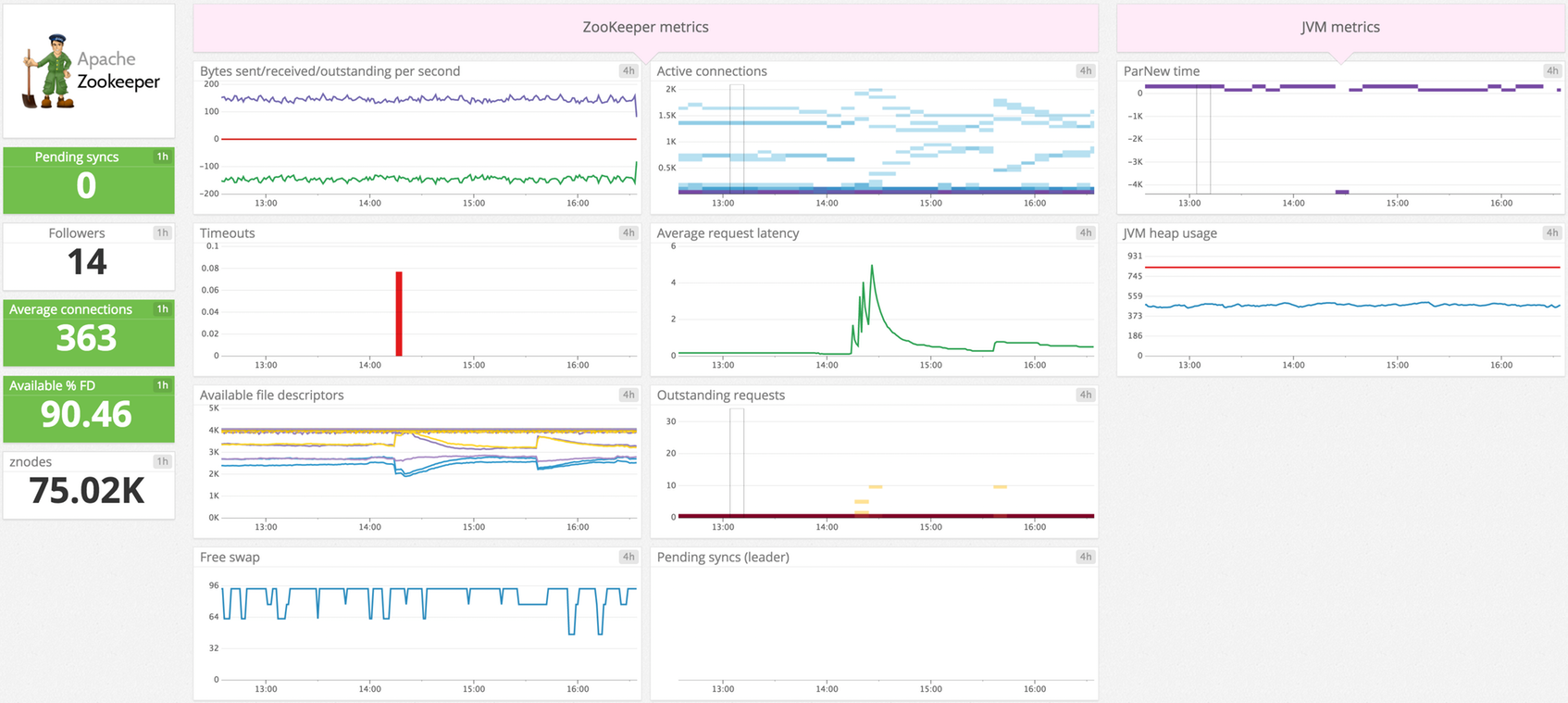The ZooKeeper check tracks client connections and latencies, monitors the number of unprocessed requests, and more.
The ZooKeeper check is included in the Datadog Agent package, so you don't need to install anything else on your ZooKeeper servers.
As of version 3.5, ZooKeeper has a 4lw.commands.whitelist parameter. See ZooKeeper Cluster Options) for an example that allows four letter word commands. By default, only srvr is whitelisted. Add stat and mntr to the whitelist, as the integration is based on these commands.
ZooKeeper 3.5 introduced the ability to use SSL authentication. For information about setting up SSL with ZooKeeper, see the ZooKeeper SSL User Guide.
After you have ZooKeeper set up with SSL, you can also configure the Datadog Agent to connect to ZooKeeper using SSL. If you already have authentication set up using JKS files, follow the steps below to convert them to PEM files for TLS/SSL configuration.
The following example commands assume that your JKS truststore and keystore files are called:
server_truststore.jksserver_keystore.jksclient_truststore.jksclient_keystore.jks
It is also assumed that both sides' keystore and truststore files have each other's certificates with aliases server_cert and client_cert, meaning that a Java ZooKeeper client can already connect to a ZooKeeper server.
If your private key has a password, make sure this password is included in the config.yaml file for config option tls_private_key_password.
To convert the JKS files to PEM files:
-
Get the
ca_cert.pemfile fromclient_truststore.jks, since the client's truststore contains the certificate of the server that is trustable:keytool -exportcert -file ca_cert.pem -keystore client_truststore.jks -alias server_cert -rfc -
Get the
cert.pemfile fromclient_keystore.jks, since the client'skeystorecontains the cert of the client for aliasclient_cert:keytool -importkeystore -srckeystore client_keystore.jks -destkeystore cert.p12 -srcstoretype jks -deststoretype pkcs12 -srcalias client_cert -
Run the
openssl pkcs12command, which exports both the client cert and the private key for the certificate. Thetls_certconfig option is able to read and parse the PEM file which contains both the cert and private key. Add-nodesto this command if you want to get a non-password-protected file:openssl pkcs12 -in cert.p12 -out cert.pem
To configure this check for an Agent running on a host:
-
Edit the
zk.d/conf.yamlfile, in theconf.d/folder at the root of your Agent's configuration directory to start collecting your ZooKeeper metrics and logs. See the sample zk.d/conf.yaml for all available configuration options.
Available for Agent versions >6.0
-
ZooKeeper uses the
log4jlogger per default. To activate the logging into a file and customize the format edit thelog4j.propertiesfile:# Set root logger level to INFO and its only appender to R log4j.rootLogger=INFO, R log4j.appender.R.File=/var/log/zookeeper.log log4j.appender.R.layout=org.apache.log4j.PatternLayout log4j.appender.R.layout.ConversionPattern=%d{yyyy-MM-dd HH:mm:ss} %-5p [%t] %c{1}:%L - %m%n -
By default, Datadog's integration pipeline supports the following conversion patterns:
%d{yyyy-MM-dd HH:mm:ss} %-5p %c{1}:%L - %m%n %d [%t] %-5p %c - %m%n %r [%t] %p %c %x - %m%nMake sure you clone and edit the integration pipeline if you have a different format.
-
Collecting logs is disabled by default in the Datadog Agent, enable it in your
datadog.yamlfile:logs_enabled: true
-
Uncomment and edit this configuration block at the bottom of your
zk.d/conf.yaml:logs: - type: file path: /var/log/zookeeper.log source: zookeeper service: myapp #To handle multi line that starts with yyyy-mm-dd use the following pattern #log_processing_rules: # - type: multi_line # name: log_start_with_date # pattern: \d{4}\-(0?[1-9]|1[012])\-(0?[1-9]|[12][0-9]|3[01])
Change the
pathandserviceparameter values and configure them for your environment. See the sample zk.d/conf.yaml for all available configuration options.
For containerized environments, see the Autodiscovery Integration Templates for guidance on applying the parameters below.
| Parameter | Value |
|---|---|
<INTEGRATION_NAME> |
zk |
<INIT_CONFIG> |
blank or {} |
<INSTANCE_CONFIG> |
{"host": "%%host%%", "port": "2181"} |
Available for Agent versions >6.0
Collecting logs is disabled by default in the Datadog Agent. To enable it, see Kubernetes Log Collection.
| Parameter | Value |
|---|---|
<LOG_CONFIG> |
{"source": "zookeeper", "service": "<SERVICE_NAME>"} |
Run the Agent's status subcommand and look for zk under the Checks section.
As of zookeeper 3.4.0, the mntr admin command is provided for easy parsing of zookeeper stats. This check first parses the stat admin command for a version number. If the zookeeper version supports mntr, it is also parsed.
Duplicate information is being reported by both mntr and stat: the duplicated
stat metrics are only kept for backward compatibility.
Important: if available, make use of the data reported by mntr, not stat.
Metric reported by mntr |
Duplicate reported by stat |
|---|---|
zookeeper.avg_latency |
zookeeper.latency.avg |
zookeeper.max_latency |
zookeeper.latency.max |
zookeeper.min_latency |
zookeeper.latency.min |
zookeeper.packets_received |
zookeeper.packets.received |
zookeeper.packets_sent |
zookeeper.packets.sent |
zookeeper.num_alive_connections |
zookeeper.connections |
zookeeper.znode_count |
zookeeper.nodes |
See metadata.csv for a list of metrics provided by this check.
The following metrics are still sent but will be removed eventually:
zookeeper.bytes_receivedzookeeper.bytes_sent
The ZooKeeper check does not include any events.
See service_checks.json for a list of service checks provided by this integration.
Need help? Contact Datadog support.
